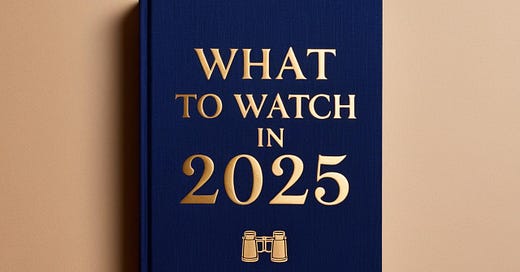🌟 Happy 2025! There’s never been a better time to join our premium newsletter and invest in yourself. It’s designed to make you a better founder, investor, and technologist. Members get access to the strategies, tactics, and wisdom of exceptional investors and founders. Today’s piece is a subscriber-only edition.
Friends,
No one can predict the future. But talking to the right people can get you much closer.
The best venture capitalists are not just money managers, but savvy prognosticators, skilled at seeing which fractal path is about to unfurl. These are the investors that spotted Solana in 2018, invested in generative AI before the ChatGPT moment, backed Airbnb when it looked like couch-surfing lunacy, and recognized the potential in prediction markets prior to Polymarket’s incredible 2024.
Looking back on these episodes can feel futile for most of us. Sure, it would have been great to have seen Stripe’s seed, but how many got that chance? As much as we might scour and research, the most intriguing possible futures usually appear to a select group first.
Toward the end of last year, I sat down and thought about what might be the single most valuable piece we could start 2025 with. I decided that what I’d find truly priceless was seeing the future more clearly.
An ideal place to start, I felt, was to hear where the most skilled investors were training their attention. I didn’t expect to agree with all of their predictions, but I felt that, in aggregate, their differing visions might guide my year in big and little ways — pushing me toward more promising startups, better stories, and more profound lessons.
If done correctly, hearing these predictions would be like getting tips from an army of brilliant friends: a few hundred conversations compressed into one collection.
So, I tried. To be specific, I reached out to more than 60 of the world’s greatest venture capitalists, and a selection of original thinkers. Many are household names known for their consistent foresight. In the piece below, for example, you’ll find submissions from Reid Hoffman, Vinod Khosla, Chris Dixon. You will also hear from exceptional insurgent investors from around the world.
Their responses fell into 13 themes that hint at the year ahead. From tech's march into Washington to AI’s next revolution, each one is full of fascinating stories and actionable information.
The end result exceeded my hopes. Reading and editing these submissions over the past few days, I’ve discovered startups and sectors I’d never considered that I now intend to dig into. I’ve also learned a great deal, gotten a better grasp of the dynamics in key markets, and developed a sense of venture capital’s current headspace.
Here’s a preview of what’s to come:
60+ investors and thinkers outline what to watch in 2025
84 startups you should keep an eye on
The impact of Silicon Valley eating government
The next “value accruer” in the Solana stack
The opportunity in AI metals mining
The “satellite bus” startup accelerating the space race
Where B2B fintech companies are poised to thrive
How cultural shifts are impacting buying habits
Our best shots of producing abundant clean energy
Where enterprise AI is heading next
How the venture asset class is poised to change
To unlock all 60+ submissions and set yourself up for the best possible year, subscribe to our premium newsletter for $22/month. It’s designed to make you a radically better investor for a teeny fraction of the cost of a traditional investing intelligence service.
My hope (and goal) is that this piece alone repays the cost of a year’s subscription.
PS. Long-time readers will know we are very happy with investors highlighting portfolio companies. Although it can constitute “talking your book,” investors have unique insight into their best companies. In the private markets, that informational asymmetry is invaluable. Anecdotally, I find that many of the best submissions come from VCs explaining why a startup they know deeply is so compelling.
PPS. You know this already, but for the avoidance of doubt: this is not investment advice. This is intended to surface new ideas and guide you toward interesting topics – not generate a return. Most submissions focus on private companies, but please heed this particularly for those that highlight a crypto project with a public token. These tend to be hyper-volatile assets. Ultimately, you should always make investment decisions based on your own research.
I. Silicon Valley eats Washington D.C.
In November 2024, America went to the polls. The results made the country’s preferences abundantly clear, ushering in another Trump presidency. This time, Trump is flanked by many of tech’s most powerful people, including Elon Musk and Marc Andreessen. Investors expect the new administration and Musk’s Department of Government Efficiency (DOGE), in particular, to create private sector opportunities and remake the tech landscape.
Social services and defense tech
The public sector is just now getting the hype we’ve anticipated. Investing in defense, modern social services, and government efficiency (think DOGE) has gone mainstream. The new administration will trigger increased tech adoption in the Department of Defense and other agencies. States will be more empowered (and hopefully resourced) to use tech to deliver services.
We see these markets taking off as the government becomes more willing to buy from scale-ups, and companies like Apex (satellite buses), Chapter (Medicare broker), Promise (benefits and payments distribution for governments), and Peregrine (unlocking data for public safety agencies) mature to provide essential products at scale. Expect massive growth in opportunities stemming from federal services moving to the state and local level and more defense players reaching for that 80x Palantir multiple that we see companies like Anduril and Cape charging toward.
The great convergence
The year will be a perfect storm, with venture capital, AI, crypto, politics, IPOs, and M&A all converging.
Artificial intelligence. The population of AI developers is expected to grow from 2 million to 3 million by the end of 2025, surpassing the population of Silicon Valley. Funding will shift its focus from quantity to quality, with investors prioritizing startups that demonstrate clear value propositions and scalable solutions in the following industries: Healthcare, biotech, nuclear energy, logistics, govtech, quantum computing, and infrastructure (picks and shovels). Despite an overall plateau in funding, the number of AI-related deals and investment activities will rise.
Crypto. The resurgence of crypto will be driven by regulatory clarity, increased institutional adoption, and establishing a US Bitcoin Reserve by the end of 2025. The United States is currently the largest holder of Bitcoin, with approximately 207,189 bitcoins in its possession. This massive stockpile will bolster the effort, now valued at over $20 billion at current prices. This decision is expected to drive up bitcoin prices, prompting other governments worldwide to follow suit.
DOGE. In 2025, the Department of Government Efficiency (DOGE), led by Elon Musk and Vivek Ramaswamy, is expected to attract 50% of new hires from Silicon Valley.
IPOs. In the fall of 2025, companies such as SpaceX, OpenAI, Stripe, SHEIN, Databricks, Canva, Chime, Anduril, and Scale AI are anticipated to go public. This expectation will trigger a wave of secondary market activities in the first half of 2025.
M&A. The world’s largest tech companies have substantial free cash reserves: Meta ($44 billion), Apple ($109 billion), Alphabet ($64 billion), Microsoft ($74 billion), Amazon ($32B) and Nvidia ($27 billion). As a result, these companies will ramp up their acquisition activities in AI, data, hardware, and energy. They’ll hope to face less pushback from the Federal Trade Commission.
East vs. West
As the East versus West global power struggle escalates geopolitically, administrations on both sides pursue isolationist strategies economically. This will lead to a physical divergence (less trade, less travel, less supply chain interdependencies) but an intellectual convergence (more scientific competition, more overlapping societal challenges, more redundant technology investments).
The detangling of the globalized economy will result in an entangling of each economy’s domestic technology roadmap – investors in the West may benefit from observing tech initiatives in the East as a leading indicator of capital flows.
II. Consumer AI heats up
The traditional opinion has been that consumer investing has been playing venture capital on hard mode over the past few years. AI may spell the end of that chill, opening up new design spaces and forcing innovators’ dilemmas.
Some investors are also looking for companies that serve businesses, in addition to pure AI consumer plays. The next ChatGPT could appear in travel, social media, or personal finance.
Beyond ChatGPT
We are incredibly excited about the coming generation of consumer AI. We have seen the mass adoption of ChatGPT (the fastest-growing consumer tech of all time) and are eager to invest in this next set of entrepreneurs who create compelling consumer experiences and applications that “do jobs” by building on the current AI infrastructure. We expect these to start small by performing personalized work, helping to book travel or buy online.
Double threats
At Footwork, we love partnering with founders daring enough to dually focus on consumers and enterprises. This has never been more true than today, where so many of the compelling AI-native companies fit this mold. For example, Cognition, Cursor, ElevenLabs, Elicit, GPTZero, Granola, HeyGen, Midjourney, Perplexity, Runway, and Suno.
We’ve partnered with several of these companies, as well as companies like Canva, which have reached scale over the past decade in both consumer and enterprise adoption. Hoping for many more in 2025 and beyond.
Antitrust and AI resurrect consumer apps
Consumer investing will return from the dead.
The death of the breakout consumer app has been well-documented! Google, Apple, Meta, and Amazon control all of the distribution chokepoints, and in the past, breaking out required luck, timing, and approximately $2 billion from a rich corporate parent (read: TikTok)!
The times, they are a-changin’. Antitrust issues have ensnared all of the major internet platform companies, so they have to be more permissive in democratizing distribution, and AI enables business-level utility for individual users without a heavy services component. Expect a renaissance of consumer app startups well beyond social that herald a new era of awesomeness for consumer investing across many different categories – entertainment, productivity, and personal finance, to name just a few.










